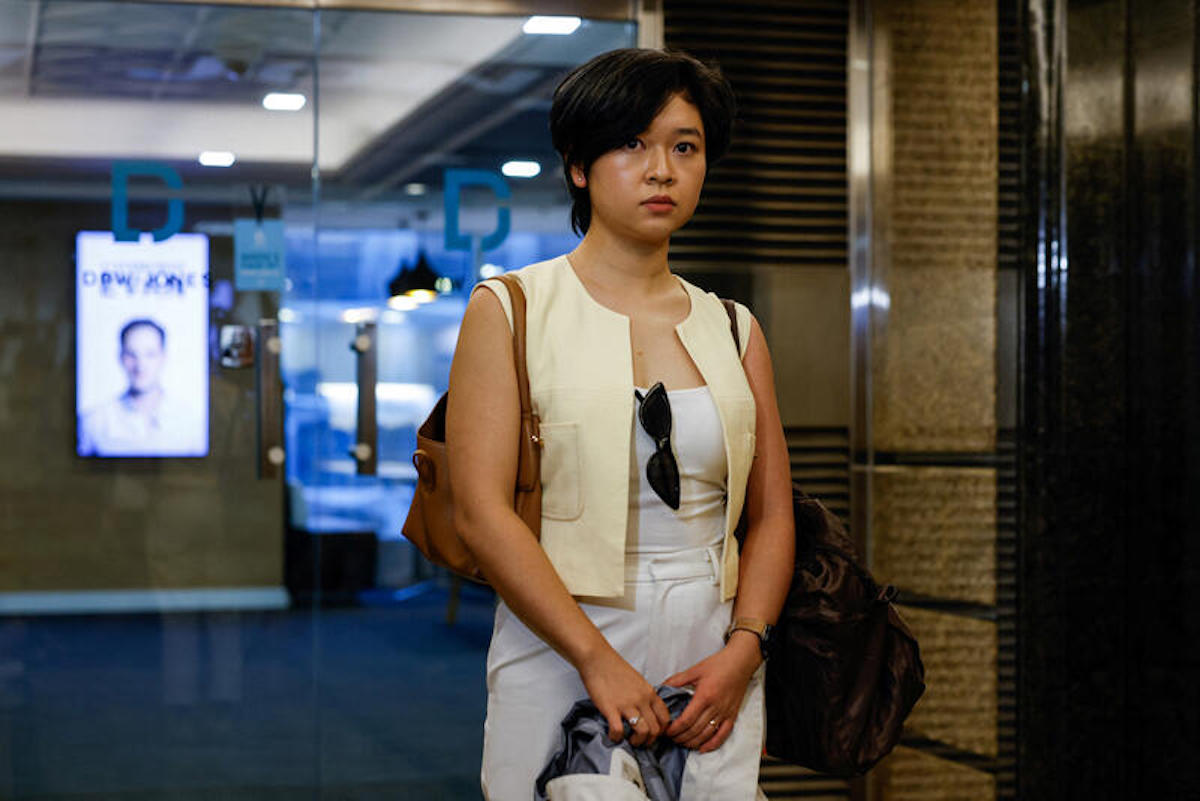Selina Cheng on her firing from the WSJ after taking up press union chair role: “I truly believed our values were aligned”

Selina Cheng leaves the Wall Street Journal office after her employment contract was terminated. A picture of her colleague Evan Gershkovich, recently sentenced by a Russian court to 16 years in jail, can be seen in the background. REUTERS/Tyrone Siu
Selina Cheng started working at the Wall Street Journal in April 2022. Her first assignments included reporting on Hong Kong’s business landscape and political situation. But soon she specialised in covering China’s thriving electric vehicle industry, a beat increasingly important for the newspaper’s audience in Europe and the United States.
For the next two years she authored 114 pieces, from an article on China’s car sales plunging amid lockdowns to this deep dive into the popularity in China of Elon Musk’s mother which was published on 20 June this year.
Four weeks after that profile was published, Cheng was fired by one of her supervisors. The stories she was working on will now remain unpublished.
Cheng thinks her dismissal is related to her election in late June as Chair of the Hong Kong Journalists Association (HKJA), a trade union also advocating for press freedom. Her supervisor asked her to withdraw from the election. A few weeks later, on 17 July, editor Gordon Fairclough flew from London to Hong Kong to deliver news of her firing in person.
In her initial statement Cheng said she was told by one of her supervisors that employees of the Journal “should not be seen as advocating for press freedom in a place like Hong Kong even though they can in Western countries, where it is already established.”
I approached the Journal with several questions about Cheng's firing. A spokesperson responded with the following statement: "While we can confirm that we made some personnel changes, we don't comment on specific individuals. The Wall Street Journal has been and continues to be a fierce and vocal advocate for press freedom in Hong Kong and around the world."
A few days ago I spoke to Cheng about the events. She stressed that she had never kept her affiliation with the HKJA from her editors. Cheng had signed up as a member in 2017 and was the secretary of its board when she joined the newspaper in 2022. She spoke briefly about that role during the hiring process and was not asked to withdraw back then.
“I discussed this with my supervisor, but it wasn't a big concern at the time,” she says.
When did things change?
Cheng doesn’t know how many of her colleagues were members of the HKJA in 2022. But she is aware that the Journal and other foreign news organisations encouraged its journalists to join the HKJA when protests broke out in Hong Kong in 2019. The city’s streets could be dangerous for reporters and police officers were trained to recognise the press cards issued by the association. So being a member of the association provided an advantage global news organisations appreciated and recognised at the time.
The government’s attitude towards the HKJA changed as the association filed several complaints against police violence.
“They became more hostile towards us,” Cheng says. “They even blamed us for giving out press cards to reporters they think are not professional, which is not true.”
It’s important to keep in mind that the HKJA is a trade union and its activities are regulated by Hong Kong’s Labour Department. Under the law of the land, the association can only welcome people who are working in the news industry.
“When members sign up,” Cheng explains, “they have to submit a form and a proof of employment. This can include the staff cards, company business cards or, for freelancers, bylined articles or payment invoices.” Once the association checks this, journalists can join for an annual fee of HKD 200 (around $25).
Today the HKJA has around 300 members. All of them are bound to the association’s code of ethics and benefit from the union’s support and social activities. Once a month the association hosts workshops, panel discussions and social events, shares resources like job postings with members and supports them when they are in need. For example, there is a protection fund members have access to if they are fired or need coverage for legal fees in relation to their work.
The association also monitors the situation of press freedom in Hong Kong and publishes an annual report on the topic that is widely covered around the world.
How is the HKJA chair elected?
According to the HKJA’s constitution, both the chair and the members of the board are elected by secret ballot during the annual general meeting of the association. Any member who is interested in taking these roles has to get a nomination from two other members, and submit their candidacy.
As soon as the association became a target, however, it was increasingly difficult to get candidates for these roles. “A lot of our members are really keen to help us as long as their names are not out there,” says Cheng. “We’ve got working subcommittees where members sign up. But the board is different because we have to make the list of board members public.”
Cheng was the only candidate for Chair this year. She only considered joining the race after she learnt that the previous chair, the Reuters Institute’s alumnus Ronson Chan, decided not to run again.
Chan was sentenced to five days in jail in September 2023 for allegedly obstructing a police officer. He was an editor at the Stand News website, one of several media outlets to close due to government pressure. Media executives and journalists from the outlet are now on trial, with a verdict expected later this year.
Cheng explains that her election was a very public process, with her candidacy widely reported in the Hong Kong press weeks before the vote. “It was not until the end of that period and one day before the election that the Journal started talking to me about this,” she says.
How is the HKJA funded?
Until 2021, the association got most of its income from a mix of private companies and public entities through an annual fundraising dinner. After the 2019 protests, they have not been able to get any funding from these institutional donors.
“They don't want to be associated with us any more,” Cheng says, “So we’ve stopped doing our annual dinner and we’ve stopped fundraising from these companies. So we are now spending the savings we’ve accumulated in previous years.”
The HKJA is now asking for donations to keep helping journalists and reporting on the situation of press freedom in Hong Kong.
According to its constitution, the association’s board can have up to 12 members. Right now it has only eight as four people dropped out after the election. “Most of them quit because of the pressure from their employers,” Cheng says. “So I'm hoping that this incident won't cause additional stress on my current board.”
Two of the journalists who left the board work for international news organisations, adding to the impression that some of these outlets are pressuring reporters to stay away from the association at this critical time. According to this piece by Diego Mendoza and Gina Chua, there are currently no reporters from international outlets represented at the board.
This article by Ryan Ho Kilpatrick from the China Media Project says several global news outlets have recently pressured their employees to stay away from being too involved with the HKJA and other press groups. “These organisations were apparently willing to benefit from the Association’s protections when they themselves were under threat, but are now reluctant to return the favour when the group – and local journalists as a whole – are in the firing line,” Kilpatrick writes.
“The silver lining is that people do care about what's happened,” Cheng says. “We were very comforted knowing that a lot of press institutions around the world have stood with us on this. Knowing that we have allies everywhere is a big boost of morale for us.”
How was Cheng fired?
Cheng’s supervisors had an initial call with her about her role at the HKJA on 20 June. One day later, they requested she withdraw from the process. “Because I was the only candidate running for chair, my withdrawal would have meant that union operations would be paralysed. So when I won, I stayed on,” Cheng wrote in this piece for CJR.
Cheng says she was aware she could be laid off, but she didn’t expect an editor would fly from London to convey the decision. “I was surprised by that,” she says. “I was fully expecting to be fired via Zoom. [The editor] didn't really explain the situation. He really just came to deliver it. I have no idea why he did that.”
From now on, the Journal intends to cover China's electric vehicle industry from outside Hong Kong. But Cheng was never given the option to relocate to Singapore or elsewhere, something she expected. She says she wouldn’t have been open to moving abroad in the short term as this would have prevented her from taking her position as HKJA’s Chair.
It’s important to stress the context of these decisions. At the time Cheng joined the Journal in April 2022, the newspaper’s Asia hub was still based in Hong Kong and the newsroom was bigger than it is now. In early May, the newspaper announced a round of layoffs and the relocation of their main Asia hub to Singapore.
After being fired, Cheng says she's privately received lots of support from her colleagues at the Journal. “They were shocked to the core that the newspaper would do this to a fellow colleague. The company has not made any attempt to explain or justify what they did to staff or address how they're feeling.”
Several reporters based in China told Cheng that they first learnt about her being fired from the state press. The Global Times, a tabloid toeing the regime’s line, celebrated the Journal’s decision and called the association "a malignant tumour that harms the city's safety and security.”
“Those working in China worry about this more than those elsewhere,” Cheng says, “because those on the China team, whether they are in Singapore or New York or Hong Kong, understand this context and also know me as a colleague.”
Running for Evan
In October 2023 Cheng joined some of her colleagues in a “Run for Evan” event along Hong Kong’s harbour. The gathering was organised by the Journal to show solidarity with its journalist Evan Gershkovich, who had been arrested in Russia. Cheng can be seen in the pictures featured in the tweet below. At the Society of Publishers in Asia Awards in late June, the newspaper stressed again its support for Gershkovich who was later sentenced by a Russian court to 16 years in jail.
Our team in Hong Kong crosses the finish line in the #IRunForEvan challenge. #IStandWithEvan pic.twitter.com/UG7bvm1hAf
— Eve Hartley (@eve_hartley) October 26, 2023
Does Cheng think her former newspaper is showing double standards? “Hong Kong reporters are still very fortunate if you compare our situation to Russia’s,” she says. “We are not afraid of getting shot or murdered or assaulted physically on the streets. But Evan is very fortunate as he has the backing of a huge media corporation. Unfortunately, most of the reporters in Hong Kong don't have that.”
Precisely because her newspaper had publicly expressed their support for press freedom, Cheng thought her role at the HKJA wouldn’t be an issue. “I truly believed that the association’s values were aligned with the Journal’s values. That’s why I was so shocked.”
Why does Cheng think that the Journal made this decision? “I really don't know,” she says. “I do think the Journal's management is affected by all the stuff that's happening in Hong Kong. Western media need to be cognisant of these things. And even as they try to protect the integrity of their reporting, when their reporters are operating in a hostile situation, they need to think whether their decisions are contributing to a better environment for the press locally or they are harming it.”
The way forward
Hong Kong is ranked 135th out of 180 countries in RSF’s World Press Freedom Index, right below Singapore and the Philippines. As this piece shows, the situation has deteriorated steadily in the past few years.
Is there a future for independent journalism in the territory? Cheng thinks things are going to be difficult, but she sees a way forward. “Hong Kong reporters are very resilient,” she says. “We are not so worried about mass arrests. Those have stopped. But there will continue to be attacks in the form of censorship within organisations and also in the form of the government's very combative attitude towards critical press coverage. The only way to counter this is to push back and do the small things that we can to hold on.”
Before the end of our conversation I asked Cheng what she thought of her supervisor’s argument that the Journal “should not be seen as advocating for press freedom in a place like Hong Kong” to preserve the appearance of impartiality on these issues.
“When people don't want to recognise the actual reason for doing something, they come up with this kind of wrangled argument to try to explain it,” Cheng said. “I don't think this argument actually works. It would work for most other things, but not for press freedom because the Journal’s staff and its content benefit directly from this basic right. So it’s really hard to argue that you can write about press freedom without any type of conflict because the news operation itself has been a beneficiary of this right.”
In every email we send you'll find original reporting, evidence-based insights, online seminars and readings curated from 100s of sources - all in 5 minutes.
- Twice a week
- More than 20,000 people receive it
- Unsubscribe any time
signup block
In every email we send you'll find original reporting, evidence-based insights, online seminars and readings curated from 100s of sources - all in 5 minutes.
- Twice a week
- More than 20,000 people receive it
- Unsubscribe any time







